Key takeaways:
- Ethical misconduct disclosures are vital for preserving integrity and public trust in medical research.
- Common types of misconduct include data fabrication, plagiarism, and ethical violations in obtaining informed consent.
- Establishing transparent reporting processes and fostering a supportive culture encourages individuals to report concerns without fear.
- Leadership and open dialogue about ethics can cultivate a culture of integrity within organizations.
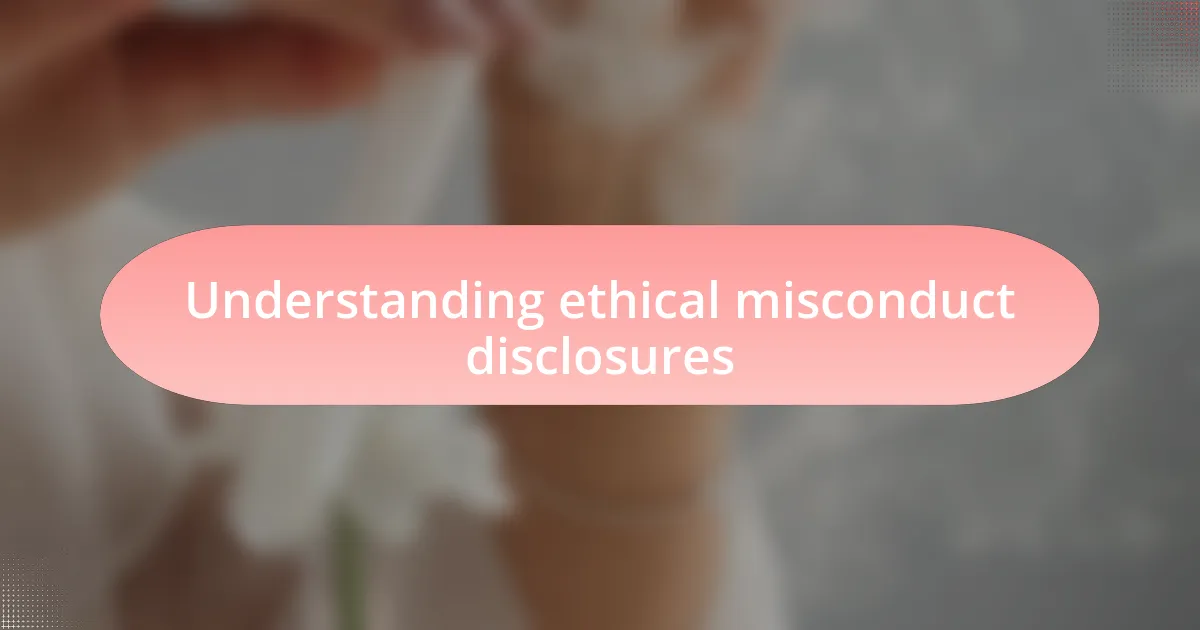
Understanding ethical misconduct disclosures
Ethical misconduct disclosures in medical research are crucial for maintaining integrity and public trust. I still remember the first time I encountered a disclosure myself; it was a sobering moment that made me realize how easily trust can be eroded. When faced with such situations, one has to ponder: what does it mean for the research community when ethical lines are crossed?
Understanding these disclosures goes beyond just acknowledging them; it’s about grappling with the implications they have on research outcomes and future studies. I once read about a case where a researcher manipulated data to achieve favorable results, ultimately compromising patient safety. It struck me deeply, highlighting the reality that every decision, no matter how small, has the potential to resonate across the entire field.
It’s essential to consider the emotional landscape surrounding ethical misconduct. When researchers come forward, they often carry the weight of potential backlash and isolation. How do they find the courage to speak up, knowing they might jeopardize their careers? It’s a tough question, but I believe that fostering an environment of openness and support is fundamental for encouraging transparency in our field.
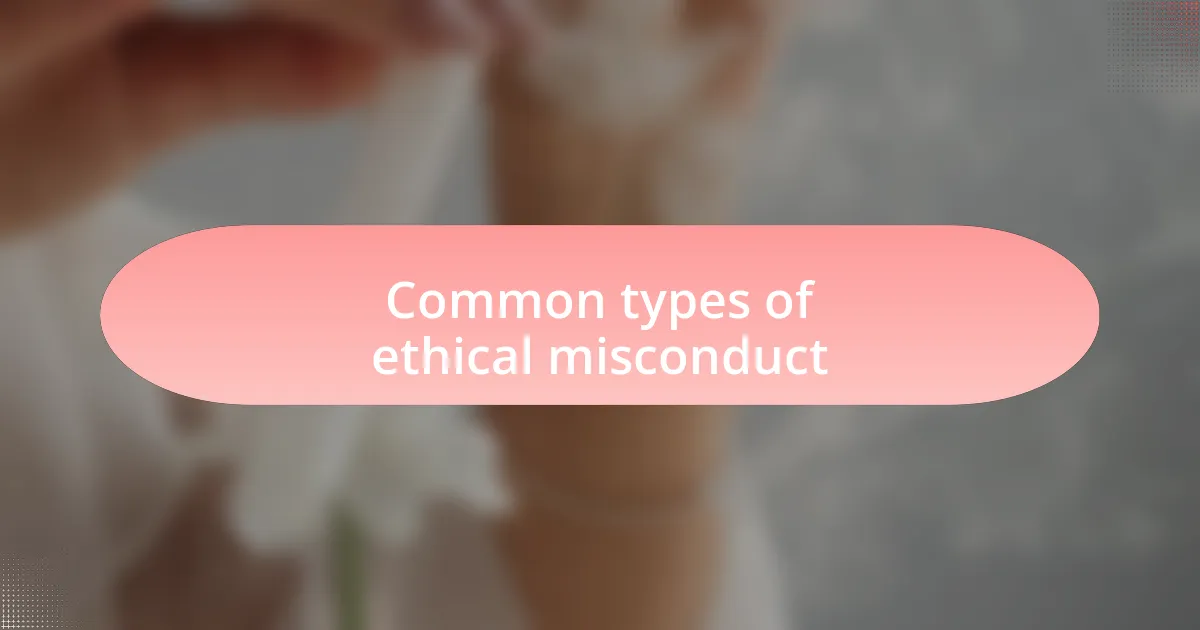
Common types of ethical misconduct
The landscape of ethical misconduct in medical research is unfortunately broad. One common type involves data fabrication, where researchers create false data to support their hypotheses. I remember discussing this with a colleague who mentioned a study she once trusted, only to later discover that the findings were entirely based on fabricated results. How do we rebuild trust when such foundational principles are breached?
Another prevalent issue is plagiarism, which undermines the very essence of scientific collaboration and innovation. I still recall a time when I was shocked to find that a respected researcher had copied sections of work without proper citation. It raised questions in me: how do we ensure that originality is respected, and how can institutions foster a culture where everyone’s contributions are valued?
Lastly, there’s the challenge of ethical violations in obtaining informed consent from research participants. I once witnessed a situation where participants weren’t fully apprised of the risks involved. It made me wonder, how can researchers balance the need for data with the ethical obligation to protect individuals? This complexity highlights the critical nature of transparency and respect in our research practices, reminding us that ethical integrity should always come first.
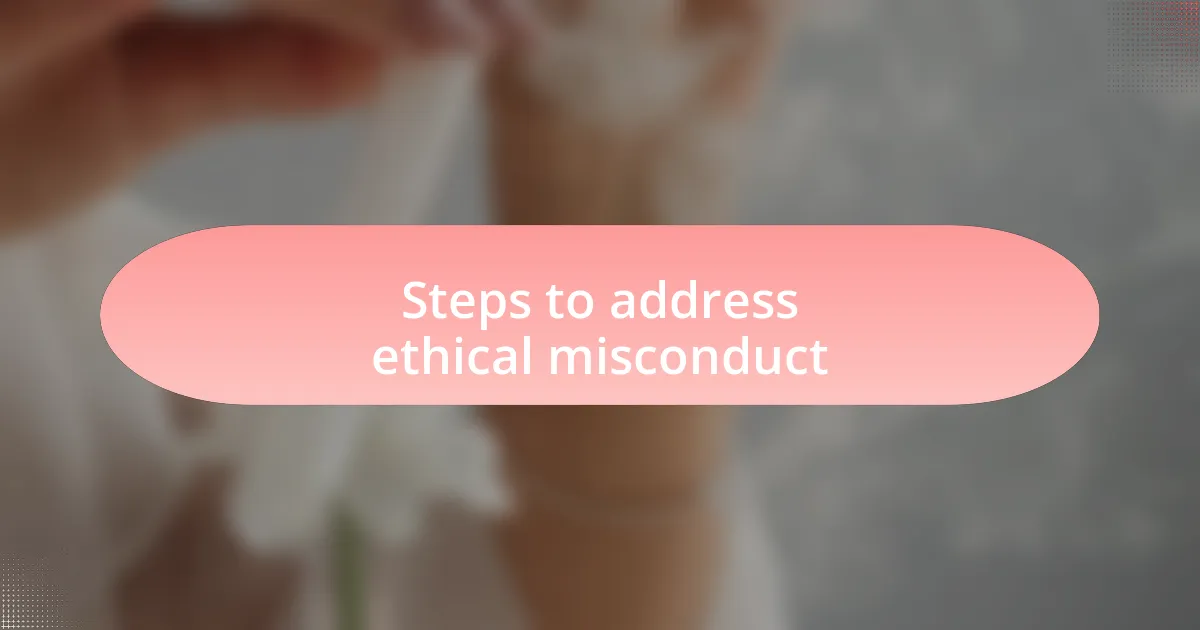
Steps to address ethical misconduct
Addressing ethical misconduct begins with the establishment of a clear reporting mechanism. I remember when my team implemented an anonymous hotline for reporting concerns. This step created a safer environment for individuals to voice their worries without fear of backlash, which I believe is crucial for fostering transparency.
Once a disclosure is made, it’s essential to conduct a thorough investigation. I experienced the impact of a diligent inquiry firsthand when a potential ethical breach was addressed swiftly and transparently. It not only clarified the situation but also reinforced our commitment to integrity, making everyone feel more secure in their roles.
Finally, transparent communication about findings and actions taken is vital for restoring trust. After we dealt with a misconduct issue in my previous research group, we held an open forum to discuss the outcomes and lessons learned. This not only showed our dedication to ethical standards but also prompted a rich dialogue about improving practices for the future. How can we grow if we don’t learn from our mistakes?
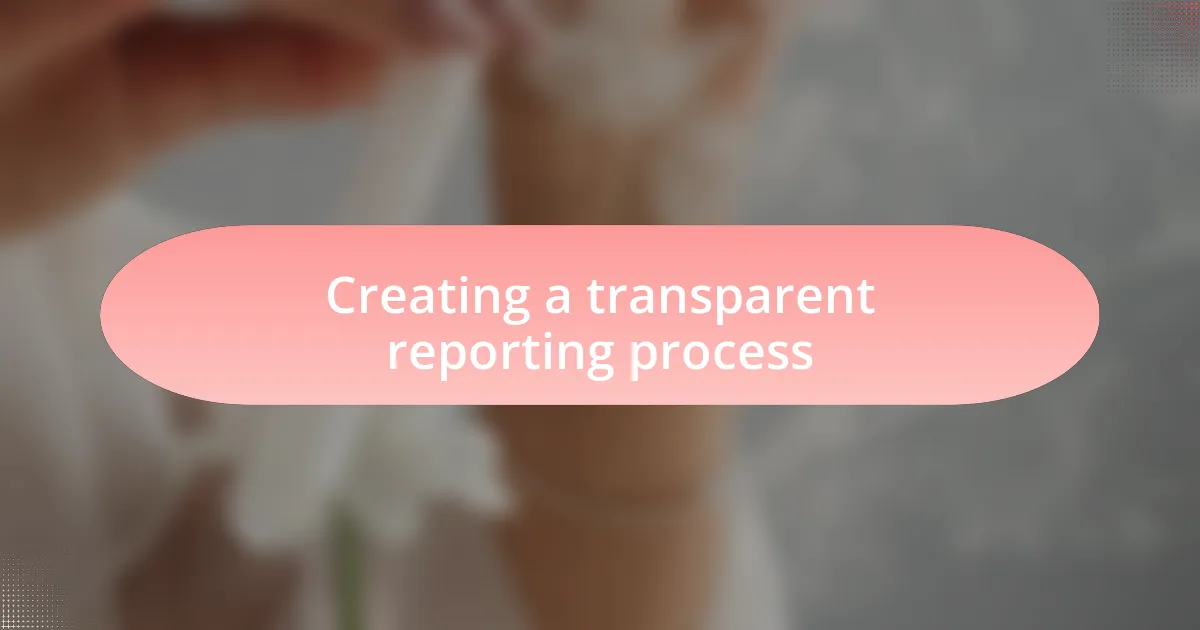
Creating a transparent reporting process
Creating a transparent reporting process is crucial for addressing ethical misconduct effectively. I recall a situation where my institute developed an online reporting system, allowing individuals to submit concerns at any time. This not only streamlined the process but also encouraged staff and participants to share their experiences openly, something I found refreshing and empowering.
In my experience, training employees on how to use the reporting system made a significant difference. I observed that when team members were educated about their rights and the importance of reporting misconduct, they felt more confident in voicing their concerns. Have you ever noticed how knowledge can change attitudes? I believe that providing clarity not only builds trust but also promotes a culture of accountability.
Moreover, regular updates on the status of reported cases can enhance transparency. I once worked on a project where we sent out monthly newsletters detailing the types of issues raised and the actions taken. It was uplifting to see the positive impact it had; people felt more engaged and recognized that their voices truly mattered. How often do we overlook the power of communication in fostering a supportive environment?
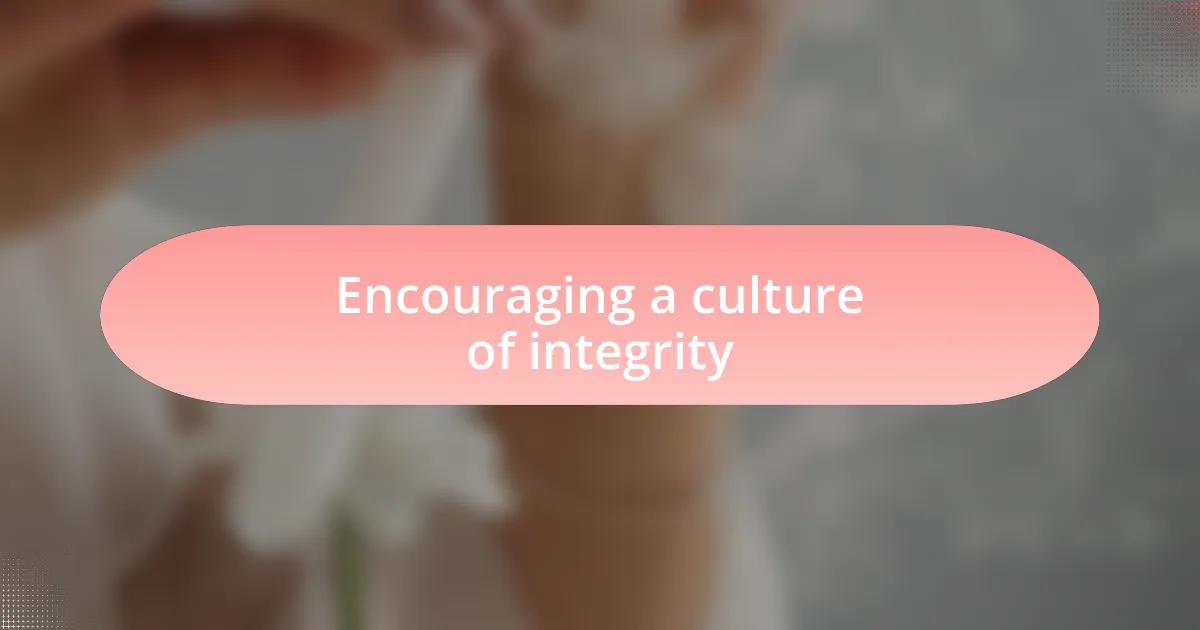
Encouraging a culture of integrity
Cultivating a culture of integrity begins with leadership setting the tone for ethical conduct. In my experience, whenever leaders model integrity and transparency, it creates a ripple effect throughout the organization. I once worked under a director who consistently demonstrated these values, making it almost effortless for the rest of us to follow suit. Have you ever had a leader whose actions inspired your own?
Creating an environment where ethical behavior is celebrated can be transformative. I remember when my team initiated an annual award for ethical practices, recognizing individuals who went above and beyond. Witnessing colleagues receive applause for their commitment to integrity not only motivated them but also inspired others to think carefully about their own choices. It was a powerful reminder that ethics can and should be woven into our daily interactions.
Additionally, encouraging open dialogue about ethics can dismantle the stigma surrounding misconduct disclosures. I frequently hosted informal discussions, inviting colleagues to share their perspectives on navigating tough ethical dilemmas. Sometimes, I relished those moments of vulnerability when people shared their challenges. Have you ever noticed how discussing these issues lights a spark of connection among team members? It was enlightening to see how much sharing experiences fostered not just understanding, but also a collective commitment to uphold integrity in every aspect of our work.
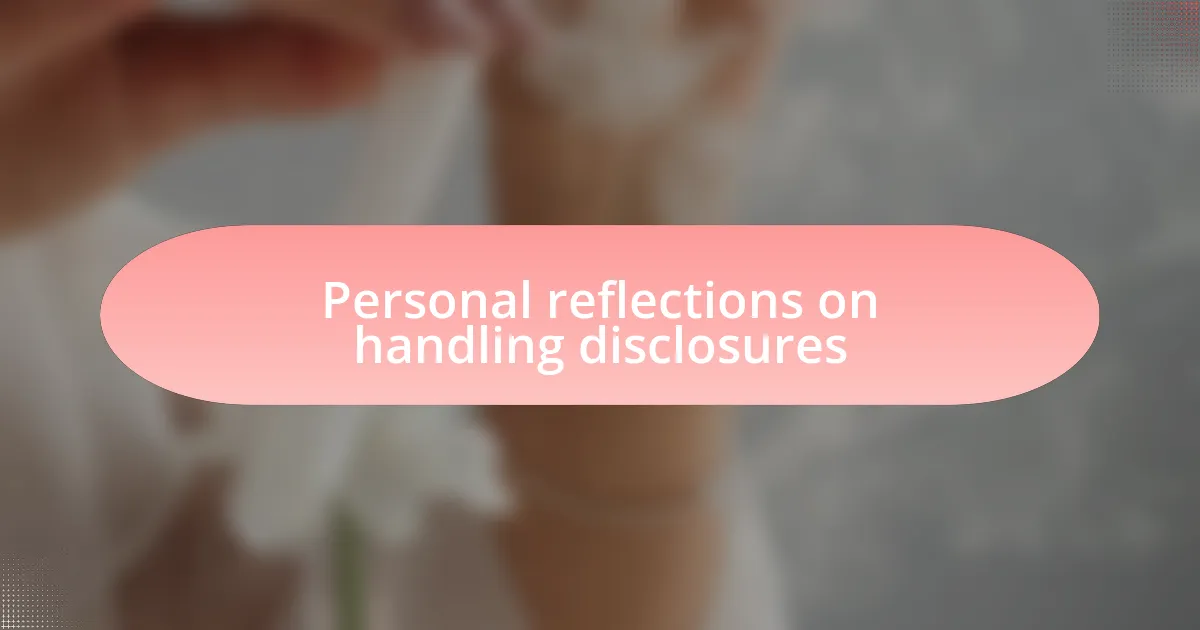
Personal reflections on handling disclosures
Handling disclosures of ethical misconduct has often felt like walking a tightrope. I vividly recall a moment when a colleague approached me, visibly shaken, about potential data falsification in a study. The gravity of the situation weighed heavily on us both, and I realized the importance of being a compassionate listener while ensuring the issue was addressed properly. Have you ever found yourself in a similar position, knowing you had to tread carefully while also being supportive?
What struck me in that encounter was how crucial it is to create a safe space for disclosures. I made it a priority to reassure my colleague that I valued their courage in coming forward. It reminded me that behind every disclosure is a human being grappling with fear and uncertainty. I often think: How can we build a culture where individuals feel empowered to speak up without fear of retribution? For me, it’s about consistent reinforcement that ethical reporting is a fundamental responsibility.
Furthermore, I’ve learned that my reaction at the moment of disclosure can set the tone for the entire process. In instances where I chose to respond with empathy and commitment to resolution, it not only fostered trust but also encouraged others to share their concerns openly in the future. Reflecting on this, I ask myself how my approach influences the morale of my team. By prioritizing a supportive response, I feel we strengthen our collective integrity, creating a ripple effect that reaches beyond individual incidents.